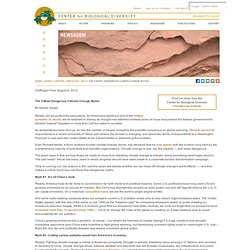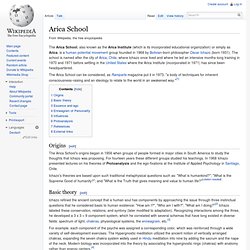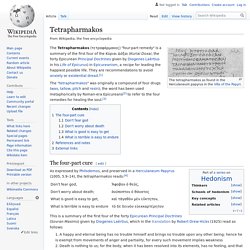

The 5 Most Dangerous Climate Change Myths. Huffington Post, August 8, 2012 The 5 Most Dangerous Climate Change Myths By Kassie Siegel Reality can be profoundly persuasive.

As Americans sweat out one of the hottest summers on record, we've watched in dismay as drought has withered endless acres of crops and pushed the federal government to declare "natural" disasters in more than half the nation's counties. As temperatures have shot up, so has the number of people accepting the scientific consensus on global warming. Even Richard Muller, a Koch brothers-funded climate-change denier, has declared that he now agrees with the position long held by the overwhelming majority of scientists and scientific organizations. The good news is that we may finally be ready to move from debating climate change to actually doing something meaningful about it. Time is running out. Myth #1: It's all China's fault. Reality: America must do far more to cut emissions for both moral and practical reasons. Myth #3: Natural gas and fracking will save us.
Animal Sleep. Most animals have a daily pattern of rest and activity.

Some animals are more active during the day (diurnal) and some are more active during the night (nocturnal). How much time do animals spend sleeping? Well, it depends on the animal: References: This table was adapted from four sources: Aserinsky, E., Eyelid condition at birth: relationship to adult mammalian sleep-waking patterns, In Rapid Eye Movement Sleep, edited by B.N. Arica School. The Arica School, also known as the Arica Institute (which is its incorporated educational organization) or simply as Arica, is a human potential movement group founded in 1968 by Bolivian-born philosopher Oscar Ichazo (born 1931).

The school is named after the city of Arica, Chile, where Ichazo once lived and where he led an intensive months-long training in 1970 and 1971 before settling in the United States where the Arica Institute (incorporated in 1971) has since been headquartered. The Arica School can be considered, as Ramparts magazine put it in 1973, "a body of techniques for inherent consciousness-raising and an ideology to relate to the world in an awakened way.
"[1] Origins[edit] The Arica School's origins began in 1956 when groups of people formed in major cities in South America to study the thoughts that Ichazo was proposing. Ichazo's theories are based upon such traditional metaphysical questions such as: "What is humankind? " Basic theory[edit] Essence and ego[edit] Tetrapharmakos. The Tetrapharmakos (τετραφάρμακος) "four-part remedy" is a summary of the first four of the Κύριαι Δόξαι (Kuriai Doxai, the forty Epicurean Principal Doctrines given by Diogenes Laërtius in his Life of Epicurus) in Epicureanism, a recipe for leading the happiest possible life.

They are recommendations to avoid anxiety or existential dread.[1] The four-part cure[edit] As expressed by Philodemos, and preserved in a Herculaneum Papyrus (1005, 4.9–14), the tetrapharmakos reads:[4] This is a summary of the first four of the forty Epicurean Principal Doctrines (Sovran Maxims) given by Diogenes Laërtius, which in the translation by Robert Drew Hicks (1925) read as follows: 1. 2. 3. 4. Don't fear god[edit] In Hellenistic religion, the gods were conceived as hypothetical beings in a perpetual state of bliss, indestructible entities that are completely invulnerable. Don't worry about death[edit] As D. What is good is easy to get[edit] What is terrible is easy to endure[edit] References and notes[edit]